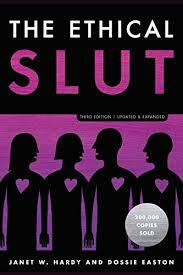You need to sign in or sign up before continuing.
Take a photo of a barcode or cover
1.03k reviews for:
The Ethical Slut, Third Edition: A Practical Guide to Polyamory, Open Relationships, and Other Freedoms in Sex and Love
Dossie Easton
1.03k reviews for:
The Ethical Slut, Third Edition: A Practical Guide to Polyamory, Open Relationships, and Other Freedoms in Sex and Love
Dossie Easton
**Important Note** the 1st edition was published in 1997 and it shows; the second edition, 2009 and it shows; the third edition, 2017 and guess what? It shows.
Books don't get to evolve and learn the way we do. Authors put down words, go through publishing, and then continue learning and growing as people. The book stays the same unless the authors put in the work to update it. *These* authors, Dossier Easton and Janet Hardy (who wrote as Catherine A. Liszt in the original publication) essentially wrote this book 3 times (as of the time of this post.)
Please read the most up to date edition of this (and any) book.
Books don't get to evolve and learn the way we do. Authors put down words, go through publishing, and then continue learning and growing as people. The book stays the same unless the authors put in the work to update it. *These* authors, Dossier Easton and Janet Hardy (who wrote as Catherine A. Liszt in the original publication) essentially wrote this book 3 times (as of the time of this post.)
Please read the most up to date edition of this (and any) book.
challenging
emotional
funny
hopeful
informative
inspiring
reflective
medium-paced
This book has been fantastic in laying out and explaining ENM and all of the wonderful potentials and options in a non-judgmental, encouraging, excited, hopeful, and informative way. Example agreements, conversations and perspectives were new to me and helped me bridge some gaps from where I am to my goals. I would put this, PolySecure, and Attached as my top three for navigating a healthy ENM journey ♥️
funny
informative
inspiring
reflective
medium-paced
Really incredible introductory book to all things non-monogamy/general sluttery! Love all the thoughtful additions of history and personal stories throughout the year. Only criticism is, feels a little repetitive in places.
adventurous
challenging
hopeful
informative
inspiring
lighthearted
reflective
medium-paced
Obviously the title is very suggestive, and there are plenty of parts in this that are very suggestive- but I honestly think this is a really good primer for just wanting to learn how to communicate in your relationships, romantic or otherwise.
Es un libro que sirve para comprender de una manera más honesta el amor libre, y como es posible gestionar las emociones que puede provocarte estar en una relación así.
Además ayuda mucho a comprender y romper los tabúes que tenemos respecto al sexo y relaciones que se salen de la normal socialmente establecida.
Aunque solo sea por curiosidad, deberías leerlo
Además ayuda mucho a comprender y romper los tabúes que tenemos respecto al sexo y relaciones que se salen de la normal socialmente establecida.
Aunque solo sea por curiosidad, deberías leerlo
Ultimately I was disappointed by this book. The first edition came out in the 60s and you can tell. Though I appreciated the ways in which it was trying to normalize non-monogamous relationships, the authors came off as condescendingly confused at times when trying to address apprehensions of people that weren’t all there yet.
I loved talking to the book club about this, a lot of good conversations about reciprocal love. At times the polyamory described in the book sounded appealing, at other times somewhat isolating, especially passages about taking soul ownership of your feelings (jealousy, hurt etc.). Though I do agree that jealousy and other feelings aren’t inherent and that they can be mitigated, passages describing what to do if you are crying because your partner is on a date sounded very lonely.
All in all, it came off as dated. It did get me more interested in learning more about non monogamy though, so maybe a good starting point?
I loved talking to the book club about this, a lot of good conversations about reciprocal love. At times the polyamory described in the book sounded appealing, at other times somewhat isolating, especially passages about taking soul ownership of your feelings (jealousy, hurt etc.). Though I do agree that jealousy and other feelings aren’t inherent and that they can be mitigated, passages describing what to do if you are crying because your partner is on a date sounded very lonely.
All in all, it came off as dated. It did get me more interested in learning more about non monogamy though, so maybe a good starting point?
I loved this book when I read it in my 20s, but I really struggled to get through it now.
This book had been mentioned in passing by enough people in my life that it warranted a proper read. Now that I've finished it, I can safely assume most (if not all) of the people who mentioned it probably haven't read it in its entirety.
It's certainly not *bad* and there's a lot of legitimate insights across its many topics - self-help, relationships, sex, etc.- but the best insights have broad application and wouldn't feel out of place in any standard CBT therapy session. Once again, not inherently a bad thing, but it makes its book-wide teachings feel meandering and a bit swampy. The best chapters towards the end are laser-focused, practical, and yes, ethically slutty.
I read the Third Edition from 2017, which talks about its focus on becoming more trans-friendly and gender-neutral, but the original text is so charmingly dated (naturally, being written by two women who formed their politics in SanFran in the 70s) that while it's a nice touch, it didn't feel properly integrated, and I suspect it couldn't be without a full re-write. This is the same eyebrow-raising text that mentions the rhythm method in a section called Birth Control(!), and uses Rajneesh / Osho as an example in a section called Utopian Sexual Societies(!).
I wonder how much of my cooler response is due to its prior hype, its position as The Bible on Poly, how much modern reading I've done on similar topics, etc... but in my mind it was Fine and could've been edited down a bit to keep its insights punchier.
tl;dr A book by hippies, for hippies, with some genuinely good insight to be found if you dig for it.
It's certainly not *bad* and there's a lot of legitimate insights across its many topics - self-help, relationships, sex, etc.- but the best insights have broad application and wouldn't feel out of place in any standard CBT therapy session. Once again, not inherently a bad thing, but it makes its book-wide teachings feel meandering and a bit swampy. The best chapters towards the end are laser-focused, practical, and yes, ethically slutty.
I read the Third Edition from 2017, which talks about its focus on becoming more trans-friendly and gender-neutral, but the original text is so charmingly dated (naturally, being written by two women who formed their politics in SanFran in the 70s) that while it's a nice touch, it didn't feel properly integrated, and I suspect it couldn't be without a full re-write. This is the same eyebrow-raising text that mentions the rhythm method in a section called Birth Control(!), and uses Rajneesh / Osho as an example in a section called Utopian Sexual Societies(!).
I wonder how much of my cooler response is due to its prior hype, its position as The Bible on Poly, how much modern reading I've done on similar topics, etc... but in my mind it was Fine and could've been edited down a bit to keep its insights punchier.
tl;dr A book by hippies, for hippies, with some genuinely good insight to be found if you dig for it.






